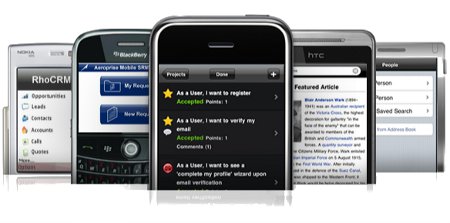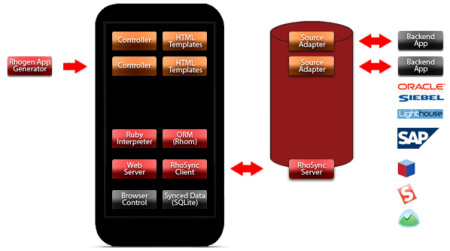Mobile development framework rev’d with native mapping
Jun 30, 2010 — by Eric Brown — from the LinuxDevices Archive — viewsRhomobile announced a new version of its cross-platform smartphone app development framework, supporting BlackBerry, Android, Windows Mobile, Symbian, WebOS, the iPhone, and the iPad. Now available for free under the open source MIT license, Rhodes 2.0 adds native mapping across devices, a metadata framework for applications with changing underlying schema, and faster sync, says the company.
Rhomobile announced its Rhodes 1.0 mobile development framework in March 2009, supporting iPhone, BlackBerry, Windows Mobile, Symbian, and Android. The company has since added WebOS and now offers iPad support. (See farther below for more Rhodes background.)
The key addition to Rhodes 2.0 is support for native mapping — annotated pushpins that link to external URLs, and which offer the ability to zoom arbitrarily, says Rhomobile. The native mapping support "extends the benefits of the iPhone's powerful native mapping capabilities to other devices such as Android and BlackBerry smartphones," says the company. The native map view is said to be easy to implement and can be displayed with one call to the Rhodes MapView object.

Rhodes mobile phone interfaces
(Click to enlarge)
Other version 2.0 additions include optimized native styling for smartphones, support for the Apple iPad, and the adoption of the permissive, GPL-compatible open source MIT license, also referred to as the X11 license. (The MIT license permits reuse within proprietary software, on the condition that the license is distributed with that software.) Previously, the company offered dual licensing for Rhodes under GPLv3 for open source apps and commercial licensing options for enterprises and ISVs.
Finally, Rhodes 2.0 offers faster, more robust sync due to memory data caching, says Rhomobile. The company touts Rhodes' ability to push synchronized data across multiple platforms as a key differentiating factor among mobile development frameworks. Rhodes' integration with Rhomobile's open source RhoSync framework, meanwhile, makes data accessible to users even when they are offline and disconnected, claims the company (see diagram farther below).
Rhodes background
Rhodes reduces mobile development costs by "up to five times," claims Rhomobile. The savings are said to be achieved by eliminating the need to develop similar applications for each mobile OS, and by using HTML instead of "diverse and complex native device OS languages."
Modeled in part on the open source Ruby on Rails framework, Rhodes combines an HTML coding framework with a Ruby interpreter. The software is said to be especially suitable for interaction with hosted enterprise application (SaaS) backends, such as CRM and ERP. Rhodes enables users to work offline with synchronized local data via a local database such as SQLite or DB40, and it can also work with a generic backend synchronization framework such as RhoSync (see diagram below).

Rhodes architecture
(Click to enlarge)
Other key Rhodes features touted by Rhomobile include:
- Model View Controller for mobile app development
- Object Relational Manager (ORM)
- App provisioning via the RhoHub hosted "Development as a Service"
- Built-in tools for test-driven development
- Interactive debugger (Android/iPhone emulators)
- Full access to device capabilities including GPS, audio, video, PIM contacts, native mapping, and camera
Stated Jonathan Tarud, Founder and CEO of Koombea, "Rhodes 2.0's native mapping capabilities allow us to easily create powerful location-based apps with contextual user interfaces. And since Rhodes is a cross-platform framework, it allows us to create apps for all leading smartphones with one set of code, providing quick development and easy application maintenance."
Stated Adam Blum, CEO of Rhomobile, "By offering Rhodes 2.0 at no cost under the MIT licenses we are providing developers with a no-risk entry to create powerful, enterprise-class native smartphone apps whether they are developing for a single smartphone OS or for all simultaneously."
Availability
The Rhodes 2.0 framework is available for free under the MIT License, here. More information, including tutorials, may be found here.
This article was originally published on LinuxDevices.com and has been donated to the open source community by QuinStreet Inc. Please visit LinuxToday.com for up-to-date news and articles about Linux and open source.